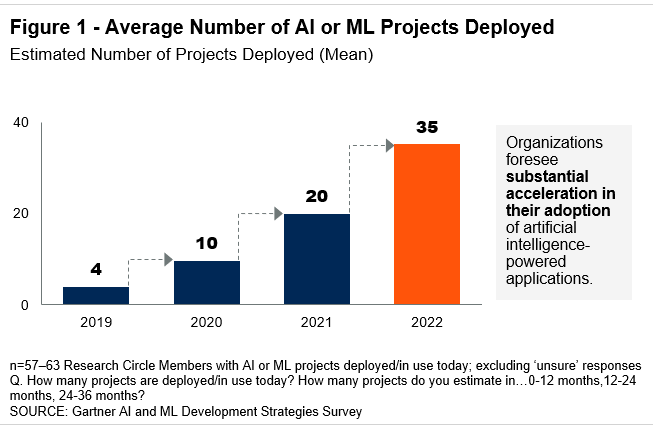The Gartner “AI and ML Development Strategies” study was conducted via an online survey in December 2018 with 106 Gartner Research Circle Members – a Gartner-managed panel composed of IT and IT/business professionals. Participants were required to be knowledgeable about the business and technology aspects of ML or AI either currently deployed or in planning at their organisations.
“We see a substantial acceleration in AI adoption this year,” said Jim Hare, research vice president at Gartner. “The rising number of AI projects means that organisations may need to reorganise internally to make sure that AI projects are properly staffed and funded. It is a best practice to establish an AI Centre of Excellence to distribute skills, obtain funding, set priorities and share best practices in the best possible way.”
Today, the average number of AI projects in place is four, but respondents expect to add six more projects in the next 12 months, and another 15 within the next three years (see Figure 1). This means that in 2022, those organisations expect to have an average of 35 AI or ML projects in place.
Customer Experience (CX) and Task Automation Are Key Motivators
Forty percent of organisations named CX as their top motivator to use AI technology. While technologies such as chat bots or virtual personal assistants can be used to serve external clients, most organisations (56%) today use AI internally to support decision making and give recommendations to employees. “It is less about replacing human workers and more about augmenting and enabling them to make better decisions faster,” Mr Hare said.
Automating tasks is the second most important project type — named by 20% of respondents as their top motivator. Examples of automation include tasks such as invoicing and contract validation in finance or automated screening and robotic interviews in HR.
The top challenges to adopting AI for respondents were a lack of skills (56%), understanding AI use cases (42%), and concerns with data scope or quality (34%). “Finding the right staff skills is a major concern whenever advanced technologies are involved,” said Mr Hare. “Skill gaps can be addressed using service providers, partnering with universities, and establishing training programs for existing employees. However, establishing a solid data management foundation is not something that you can improvise. Reliable data quality is critical for delivering accurate insights, building trust and reducing bias. Data readiness must be a top concern for all AI projects.”
Measuring the Success of AI Projects
The survey showed that many organisations use efficiency as a target success measurement when they seek to measure a project’s merit. “Using efficiency targets as a way of showing value is more prevalent in organisations who say they are conservative or mainstream in their adoption profiles. Companies who say they’re aggressive in adoption strategies were much more likely instead to say they were seeking improvements in customer engagement,” said Whit Andrews, distinguished research vice president at Gartner.




